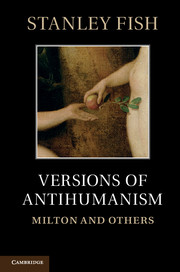Book contents
- Frontmatter
- Contents
- Acknowledgments
- Introduction: intention, historicism and interpretation
- Part I Milton
- Part II Early modern literature
- Chapter 8 “Void of storie”
- Chapter 9 Authors–readers
- Chapter 10 Marvell and the art of disappearance
- Chapter 11 Masculine persuasive force: Donne and verbal power
- Chapter 12 How Hobbes works
- Index
- References
Chapter 9 - Authors–readers
Jonson's community of the same
Published online by Cambridge University Press: 05 May 2012
- Frontmatter
- Contents
- Acknowledgments
- Introduction: intention, historicism and interpretation
- Part I Milton
- Part II Early modern literature
- Chapter 8 “Void of storie”
- Chapter 9 Authors–readers
- Chapter 10 Marvell and the art of disappearance
- Chapter 11 Masculine persuasive force: Donne and verbal power
- Chapter 12 How Hobbes works
- Index
- References
Summary
INTRODUCTION
In the course of her incisive and powerful study of the rise of professionalism, Magali Sarfatti Larson identifies as one of the chief cognitive supports of the professional ethos something she calls the “ideology of merit” (213). By this she means what is to us the very familiar notion (not to say conviction) that in modern corporate and academic life one rises by virtue of native ability and demonstrated competence rather than by the accidents of birth and fortune. Larson labels this notion “ideological” first because it is elaborated in the service of certain well-defined interests (largely those of the corporate bourgeoisie), and second because it masks what actually happens when the professional sets out to climb the ladder of advancement. What the professional tells himself (because he has been told it by others) is that as an individual, he is “essentially the proprietor of his own person and capacities, for which he owes nothing to society” (222), but in fact, as Larson points out, he owes everything to society, including the self whose independence supposedly enables and underwrites his achievements. That is to say, it is only with reference to the articulation and hierarchies of a professional bureaucracy that a sense of the self and its worth – its merit – emerges and becomes measurable. The ladder of advancement is not only a structural fact; it is a fact that tells the person who occupies a place on it who he is and what he has accomplished. By providing goals and aspirations and alternative courses of action, the ladder also provides the very “means of self-assertion” (199). “Career,” Larson declares, “is a pattern of organization of the self ” (229); or to put it another (less aphoristic) way, the self of the professional is constituted and legitimized by the very structures – social and institutional – from which it is supposedly aloof.
- Type
- Chapter
- Information
- Versions of AntihumanismMilton and Others, pp. 169 - 205Publisher: Cambridge University PressPrint publication year: 2012



